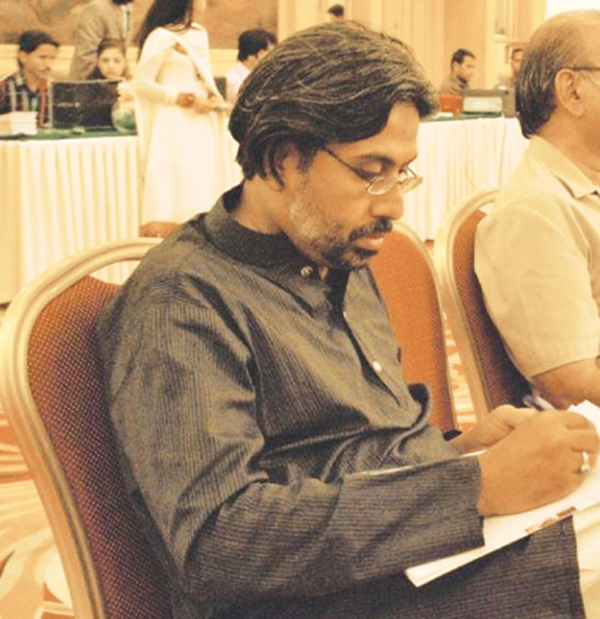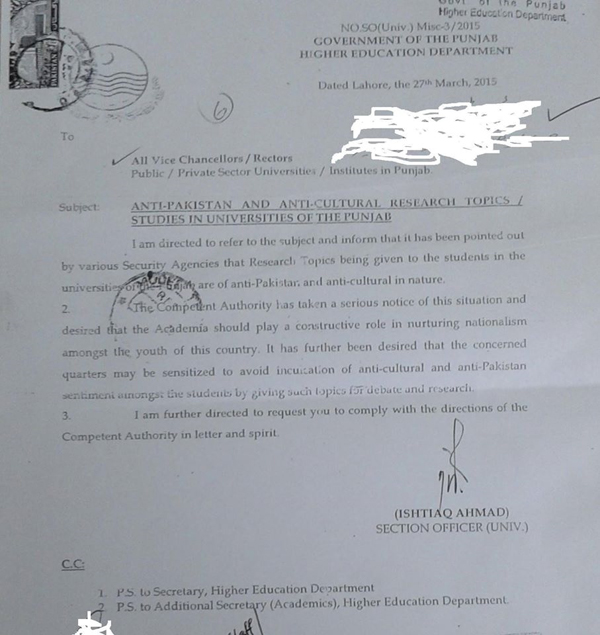
Dr. Waheed Rehman – Photo courtesy, thenews.com.pk
The menace of “unknown persons” shooting to death intellectuals and activists in Pakistan continues. Pakistan is witnessing an upsurge of attacks on professors and intellectuals; recently an Assistant Professor at the Department of Mass Communication at Karachi University, Dr. Waheed Rehman, well known by his pen name Yasir Rizvi, was shot dead by four unidentified attackers riding two motorcycles, who opened fire on his car.
Dr. Rehman’s killing is a part of a series of murders of academics and civil society members in the city of Karachi, the commercial and industrial capital of Pakistan.
Sabeen Mahmud, prominent freedom of speech activist and owner of T2F [The Second Floor], a well-known hub for poets and intellectuals in Karachi, was shot dead by “unknown assailants” recently, on 25 April 2015, when she was returning home from a talk at T2F on the subject of Baluchistan, titled “Un silencing Baluchistan Take 2”. (Read more here)
On 16 April 2015, the Vice-Principal of a medical college in Karachi, Ms. Debra Lobo, was shot and seriously injured.
And, on 18 September 2014, a liberal Muslim scholar, Dr. Muhammad Shakil Auj, accused of blasphemy for a speech delivered on a visit to the United States, was shot and killed in Karachi. Dr. Auj was then Dean of Islamic Studies at Karachi University. (Read more here)
And, earlier, on 7 May 2014, a lawyer, Mr. Rashid Rehman, was shot dead for defending the blasphemy accused Professor Junaid Hafeez. (Read more here)
There is a clear trend in these killings. Members of academia, journalists, human right defenders, and activists are increasingly being targeted for speaking up against fundamentalism and the militarization of Pakistan.
The wider ramifications beyond the individual killings, is the impact on society at various levels. One direct effect is that on academic freedom. A 2014 report by the Global Coalition to Protect Education from Attack Pakistan is mentioned as one of the six most “heavily affected” countries for violence against schools and universities. Hundreds of attacks were recognized and one student and four academics were killed between 2009 and 2012, according to the report.
Universities, all over the world, are supposed to be hubs of intellectual discourse. However, according to a new directive sent by the Punjab Provincial Government to all vice chancellors and rectors of public and private varsities in the Province, critical thinking must be abandoned for silent compliance.
The directive was issued following a scheduled seminar on the issue of Baluchistan titled “Unsilencing Baluchistan” that was supposed to be held at Lahore University of Management Science (LUMS). The discussion was cancelled at the eleventh hour due to pressure from intelligence agencies and the Punjab Government, as, according to them, the discussions could be used to malign Pakistan.

The directive states the following:
“It has been pointed out by various security agencies that research topics being given to the student in the universities in Punjab are of anti–Pakistan and anti cultural in nature. The competent authority has taken a serious notice of the situation and desire that the academia should play a constructive role in nurturing nationalism amongst the youth of this country. It is further been desired that the concerned quarters may be sensitized to avoid inculcation of anti cultural and anti Pakistan sentiment amongst the students by giving such topics for debate and research.”
This directive brings to the forefront the state of academic freedom in Pakistan. Stunted development in terms of research is the result of academic censorship being forced upon all varsities. The intent is to churn out a state-compliant graduate who will join the mainstream and serve the state without question. Critical thinking has been stunted so irreparably that no one bothers to question the usurpation of freedom of speech and expression anymore.
Pakistan’s powerful military and intelligence agencies have been calling the shots for more than half of Pakistan’s existence; media and press freedom have always been curtailed. The state’s intolerance for dissent has been a hallmark of both civil and military regimes. The vernacular press, especially, has always been at a receiving end of the State’s ire, for reporting any version detrimental to government’s popularity. However, now the blazing guns are being pointed at varsities. Muzzling free speech is a direct violation of provisions of UN ICCPR, to which Pakistan is signatory.
Freedom of expression and right to have dissenting views is a birth right of every individual subject to reasonable restriction. Academic freedom cannot be subjected to state control and censorship. The State’s meddling in the affairs of the academic activities and active curtailment of critical thinking is uncalled for and unjustified. The Asian Human Rights Commission demands that the Pakistan State and its intelligence agencies stop intruding in the affairs of the varsities. The State and its institutions are supposed to protect the interest of its subjects rather than usurping their fundamental rights.